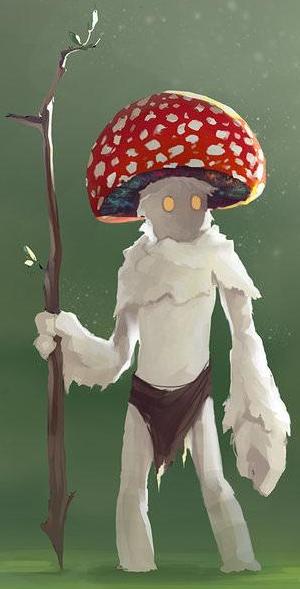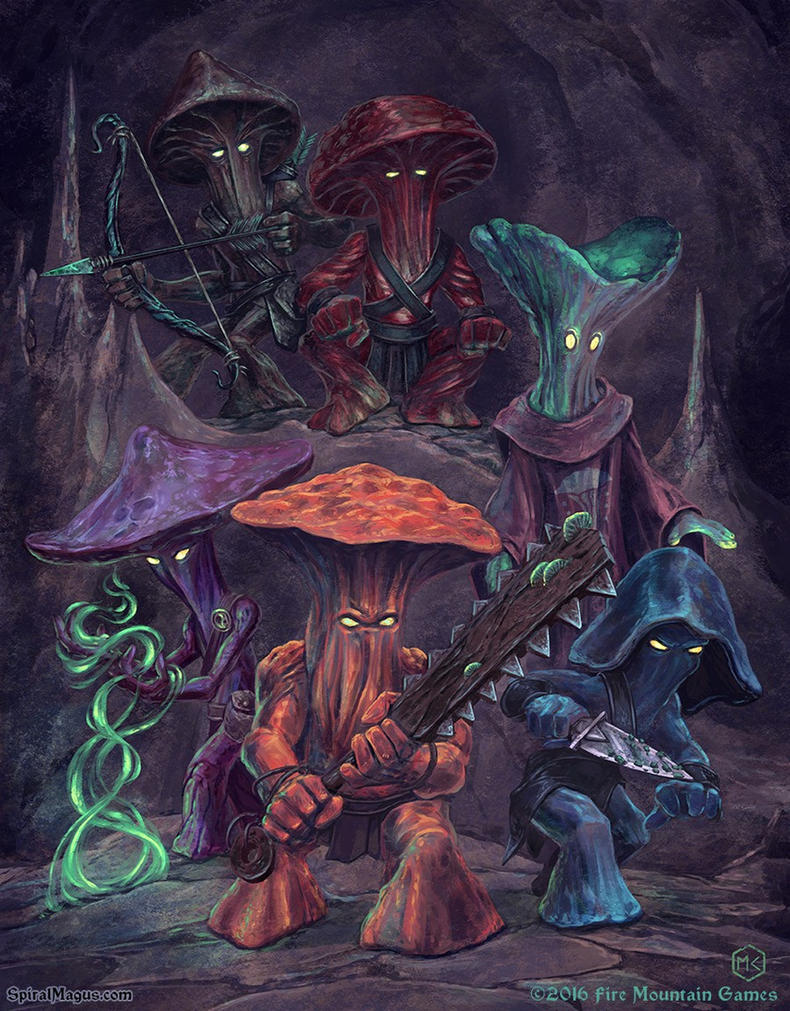
Myconids
Also called "mushroom men" or "fungus ones", myconids are intelligent, ambulatory fungi that live in the Underdark and the deepest, darkest depths of forests, seeking enlightenment and deploring violence. If approached peacefully, myconids gladly provide shelter or allow safe passage through their colonies. Violence taints their melds, so the myconids enter battle only in defense or as a last resort, viewing violence as part of the abhorrent nature of fleshy outsiders.
Instead, the moving plants prefer a peaceable lifestyle, finding joy in pastoral commonality and shared happiness. Living in circles of roughly twenty myconids or settlements of larger groups, myconids cultivate nonsentient mushrooms and myconid sprouts in gardens. The precise 8-hour divisions of leisure, work, and melding creates a satisfying, if regimented, existence for these creatures, which regard such a lifestyle as completely ideal.
Circles and Melds
The largest myconid in a colony is its sovereign, which presides over one or more social groups called circles, which live in quiet groves bereft of speech but exploding with the color of the diverse plants, fungi, and compost within. A circle of myconids that work, live, and meld together with the sovereign, which settles disputes and makes decisions to benefit the entire group.
A meld is a form of communal meditation that allows myconids to transcend their damp, pastoral existence. The myconids' rapport spores bind the participants into a group consciousness. Hallucination spores then induce a shared dream that provides comfort and social interaction. Myconids consider melding to be an enlightening act and the purpose of their existence. They use it in the pursuit of higher consciousness, collective union, and spiritual apotheosis. Myconids also use their rapport spores to communicate telepathically with "softies" who come seeking shelter or conflict.
The Power of Spores
In addition to the versatile rapport spores and sublime hallucination spores, myconids use reproduction spores to plant children. The new young are cultivated in gardens to become myconid sprouts, precocious young raised communally by the circle. Pacifying spores stun hostile intruders so the group might flee or wield a spore servant against them. Spore servants represent a terrifying aspect of the fungal race—the corpse of a once-living creature raised to serve as soldiers, guards, and scouts. Creatures controlled by these animating spores serve the myconids for weeks on end, until decay collapses their bodies completely.
Anatomy of a Fungus
Myconids are bipedal, with strong, squat bodies supported by strong, trunklike legs with vestigial toes. Each myconid has two arms that ends with a pair of fingers and a single thumb, more than sufficient for their simple agriculture. While their mycelial bodies provide notable durability, myconids are not typically skilled fighters. Myconids grow drastically over their lives, with sprouts barely reaching two feet and sovereigns towering to almost twelve.
Flight from the Sun
Myconids cannot survive in the sun. Direct light sickens them severely, and an hour of exposure kills them outright. Even the most durable of the adventuring myconids are not immune to the power of the sun. Wandering on the surface is a constant risk for most myconids, who instead flock to the Underdark or shelters of moist darkness in the oldest of forests where canopies of trees create a perpetual twilight. There they find shelter in damp marshes and springs, surrounded by moss and lesser mushrooms which they cultivate for food and grow for use as building materials.
Myconid adventurers
It is rare that a myconid voluntarily leaves their circles for long. Their love of community melding and the risk of the sun restricts nearly all myconids to their subterranean or arboreal homes. What few myconids dare venture out into the world have distinct reasons for leaving their comfortable, insular homes and traveling out into the wider world.
| 1d6 | Reason for becoming an adventurer |
|---|---|
| 1 | The regimented structure of myconid life seemed oppressive to you, so you left seeking adventure. |
| 2 | You left your circle as part of a scouting party; when you returned the circle had been destroyed, leaving you homeless. |
| 3 | As one of the oldest myconids in your circle, you were sent to gather experience and knowledge of the outside world to prepare you to lead the circle as a sovereign. |
| 4 | Your circle became too large. You are looking for the perfect place to spread your reproduction spores and found a new circle. |
| 5 | You slew a fellow myconid. Whatever your reason, such an act cannot be allowed to taint the meld, so you were banished. |
| 6 | You met an outsider taking shelter in your circle's grove who regaled you with tales of the outside world, so you left to see what the world offers. |
Myconid Names
Myconid names sound nonsensical to outside ears, but are in fact derived from "softy" vocabulary. Myconids rarely use names within their circles, preferring rapport spores and the connections of melding to refer to each other in concept rather than word. They often take names from sounds that each myconid finds pleasing to the ear, borrowing from the world around them or from a wandering traveler offered hospitality in their groves. Others adopt mushroom-related vocabulary that they find pleasant.
Myconid Names: Basidia, Breberil, Brelup, Gasbide, Hebopbe, Loobamub, Phylo, Posbara, Rasharoo, Rumpadump, Stool, Yestabrod.
Myconid Traits
Myconids possess a diverse variety of physical features, but they all share a few core traits.
Ability Score Increase. Your Constitution score increases by 2.
Age. Myconids grow quickly, reaching maturity by the age of four and living just under a quarter of a century. A myconid sovereign lives far longer, and their lifespan is unknown.
Size. Myconids vary incredibly in size, which is determined by their age and circle.
Speed. Your walking speed is 20 feet.
Darkvision. Raised in the dimmest forests and the depths of the Underdark, you can see in dim light within 60 feet of you as if it were bright light, and in darkness as if it were dim light. You can't discern color in darkness, only shades of gray.
Fungal Form. You have advantage on saving throws against poison, and resistance to poison damage.
Hybrid Nature. You have two creature types: humanoid and plant. You can be affected by a game effect if it works on either of your creature types.
Rapport Spores. Myconids cannot speak, but you can communicate telepathically with all creatures within 30 ft. of you, provided you and the creature share a language.
You are not, however, nonverbal; myconids still hum, whistle, and grumble, which forms the verbal components for your spells if you cast them. If you are silenced by an effect, you can still communicate telepathically with your spores, but you cannot use spells with a Verbal component.
Sunlight Sensitivity. Though exposure to sunlight will not kill you like most myconids, you have disadvantage on attack rolls and on Wisdom (Perception) checks that rely on sight when you, the target of your attack, or whatever you are trying to perceive is in direct sunlight.
Pheremone Spores. Myconid sprouts learn to bathe threats in scented spores on sight so older and stronger members of the circle can track and destroy them. You can use a bonus action to cover one creature that you can see within 60 feet of you with those spores. For 1 minute, you and all other myconids and spore servants have advantage on attack rolls against that creature. You can fire those spores a number of times equal to your Constitution modifier (a minimum of once) and regain all expended uses when you complete a long rest.
Language. You can read, understand, and write Common. You cannot speak it.
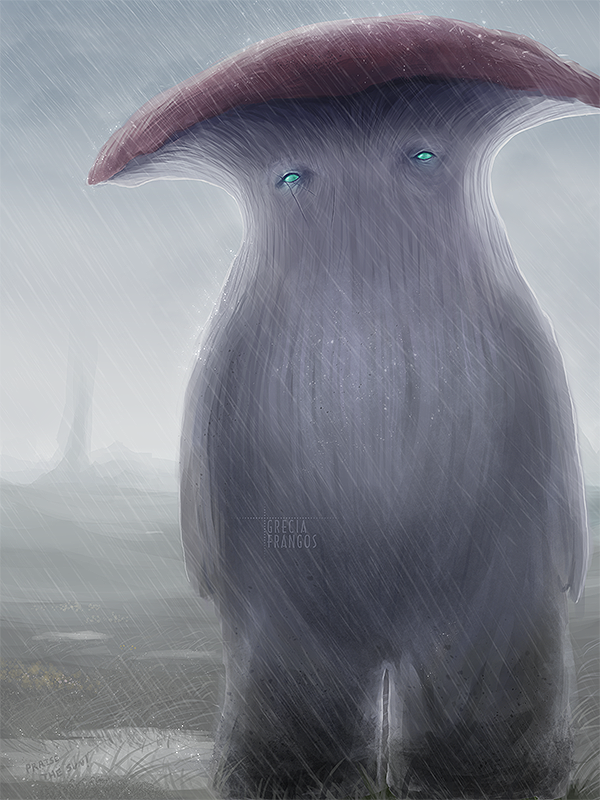
Subrace. Choose one of the Melds below, which determine your physique and role in your society. You gain additional features and traits based on which you choose.
Growth
The oldest and mightiest of the fungal ones, Growth Meld myconids labor in gardens of fungi and construct homes of hollowed puffballs or giant zurkhwood. Gentle giants, they are responsible for protecting delicate and precious myconid sprouts, and are the first line of defense when controlled plants and spore servants are exhausted. Preferring great old-growth forests filled with mists and fog, these myconids are quiet sentinels of their homes hidden by the trunks of ancient trees.
Size. Towering over most other myconids and other humanoids, your height ranges from 8 to 10 feet tall. Your size is medium.
Ability Score Increase. Your Strength score score increases by 1.
Mycelial Restoration. Whenever you or another creature rolls a 1 on a die roll that restores your hit points, you can reroll the die. You must use the new roll, and can reroll a number of 1s equal to your level.
You can also apply this feature to up to 10 creatures of your choice within 60 feet you when they roll hit dice during a short rest. Once you use this feature on other creatures, you cannot do so again until you complete a long rest.
Powerful Build. You count as one size larger when determining your carrying capacity and the weight you can push, drag, or lift. If using The Warrior's Codex Reforged, you also count as one one size larger when determining the creatures you can grapple or shove.
Language. You can read, understand, and write Sylvan. You cannot speak it.
Sporemaster
The wielders of the most powerful spores, Sporemasters are responsible for facilitating melds, vital to myconids' daily life. Intuitive and wise, they serve as some of the most important members of a myconid circle. A sporemaster leaving the circle indicates a great disturbance or terrible tragedy.
Size. Despite their importance, sporemasters are tiny, sacrificing size for versatility. Your height ranges from 2 to 4 feet, and your size is Small.
Ability Score Increase. Your Wisdom score score increases by 1.
Fungal Alchemy. Sporemasters have an innate understanding of alchemy, often using their spores as ingredients. You gain proficiency in Alchemists' Supplies.
Spores. As you level up, you gain access to more powerful spores. If your spore's effects require a saving throw, the DC equals 8 + your proficiency bonus + your Constitution modifier. You can use each spore option once, and must complete a long rest before you do so again.
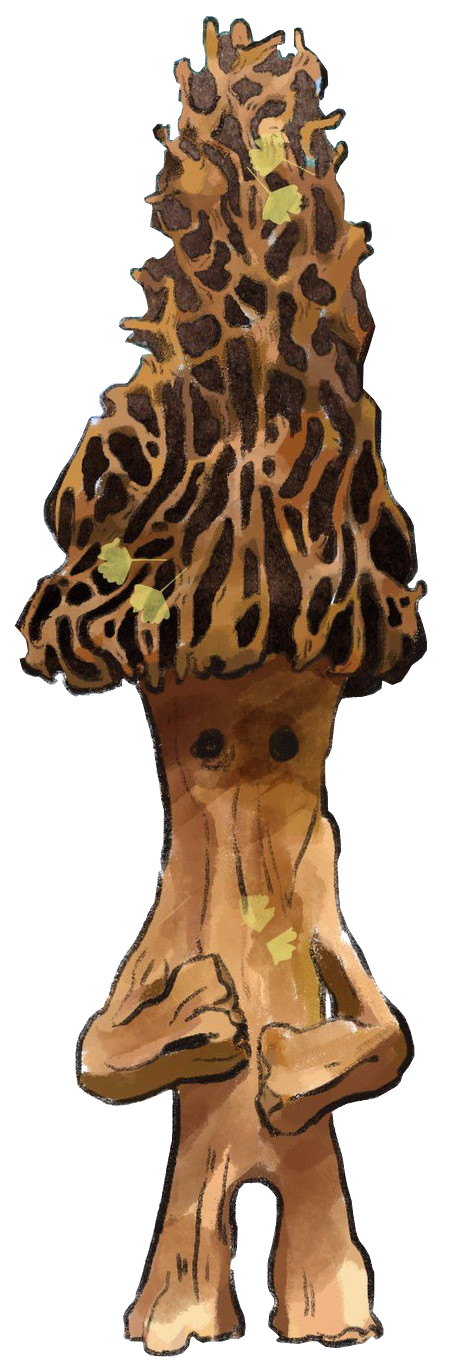
Sporemaster Progression
| Level | Spore |
|---|---|
| 1 | Distress |
| 3 | Hallucination |
| 5 | Pacifying |
Distress Spores. When you take damage, all creatures your choice within 240 feet of you are alerted.
Hallucination Spores. As an action, you can force a creature within 5 feet of you to make Constitution saving throw. On a failed save, the target is poisoned for 1 minute. While poisoned in this way, it is also incapacitated while it hallucinates. it can repeat the saving throw at the end of each of its turns, ending the effect on itself on a success.
Pacifying Spores. As an action, you can force a creature within 5 feet of you to make a Constitution saving throw. On a failed save, the target is stunned for 1 minute. It can repeat the saving throw at the end of each of its turns, ending the effect on itself on a success.
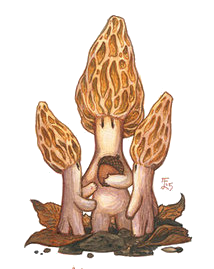
Animation
Terrifying to outsiders, Animation Melds release potent spores that take root in the bodies of defeated foes or scavenged cadavers. They manipulate the bodies in a horrific facsimile of life and wield them as the frontline whenever circles are attacked.
Size. Sacrificing size for their ability to manipulate corpses, Animation myconids stand slightly smaller than most adults, between 4 and 5 feet tall. Your size is medium.
Ability Score Increase. Your Charisma score score increases by 1.
Animating Spores. Your spores, unlike other myconids can animate the dead. You can use an action to target the body of a Large or smaller creature that had a CR no higher than your level divied by 4. That creature rises as a spore servant, which acts on your initiative and follows your telepathic orders. You can use this feature once, and must finish a long rest before you do so again.
Elementals, oozes, undead, constructs, and plants cannot become Spore Servants. If you create a new one, the first spore servant sloughs into a pile of unusable flesh.
Superior Darkvision. Accustomed to the depths of the Underdark, you have superior vision in dark and dim conditions. You can see in dim light within 120 feet of you as if it were bright light, and in darkness as if it were dim light. You can't discern color in darkness, only shades of gray.
Language. You can read, understand, and write Undercommon. You cannot speak it.
Spore Servant Template
Retained characteristics. The servant retains it Armor Class, hit points, Hit Dice, Strength, Dexterity, Constitution, vulnerabilities, resistances, and immunities.
Lost Characteristics. The servant loses its original saving throw and skill bonuses, special sense, and special traits. It loses any action that isn't Multiattack or a melee weapon attack that deals bludgeoning, piercing, or slashing damage. If those attack do not deal or deal additional damage of a type not bludgeoning, piercing, or slashing, that damage is lost, unless it originates from a piece of equipment, such as a magic item. It also cannot regain hit points by completing a short or long rest.
Type. The creature's type is plant and it loses any tags.
Alignment. The servant is unaligned.
Speed. Reduce all the servant's speeds by 10 feet, to a minimum of 5 feet.
Ability Scores. The servant's ability scores change as follows: Int 2 (-4), Wis 6 (-2), Cha 1 (-5).
Senses. The servant has blindsight with a radius of 30 feet and is blind beyond that radius.
Condition Immunities. The servant can't be blinded, charmed, frightened, or paralyzed.
Languages. The servant loses all known languages, but responds to orders given to it via rapport spores. The servant gives the highest priority to the myconid that created it, or the most powerful myconid if its creator is absent.
Attacks If the servant has no other means of dealing damage, it can use its fists or limbs to make unarmed strikes. On a hit, the unarmed strike deals bludgeoning damage equal to 1d4 + the servant's Strength modifier, or, if the servant is Large, 2d4 + its Strength modifier.
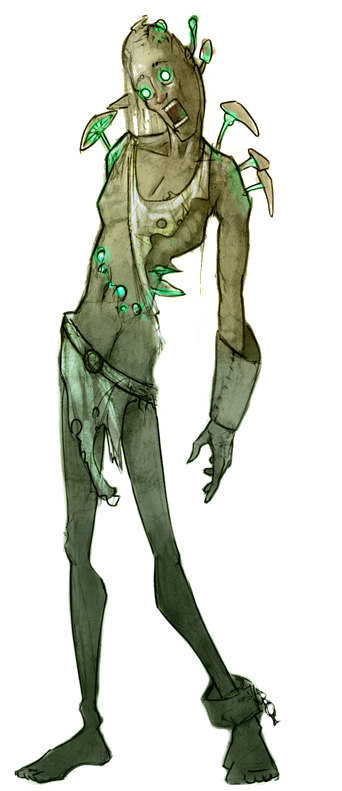
Compost
Food producers and masters of death and decay, Compost Meld myconids secrete toxic slime that breaks down organic material into a form that other myconids can easily stand in and digest. Responsible for the health and nourishment of a circle, they are the most common type of myconid.
Size. Compost myconids stand between 6 and 8 feet tall. Your size is Medium.
Ability Score Increase. Your Dexterity score score increases by 1.
Fertilizer. You know the rotting gaze cantrip. Once you reach 3rd level, you can cast the locate animals or plants spell; you must finish a long rest in order to cast the spell again using this trait. Once you reach 5th level, you can also cast the plant growth spell; you must finish a long rest in order to cast the spell again using this trait. Wisdom is your spellcasting ability for these spells.
Toxic Body. Your body secretes a poisonous substance that breaks down organic matter. When a creature touches you or hits you with a melee attack from a natural weapon, you can deal 1d4 poison damage to it. The first time on a turn that you hit a creature with an unarmed strike, it takes an additional 1d4 poison damage.
*Rotting gaze can be found in the homebrew compendium Mashiro's Manual of Monstrous Magic. If your Dungeon Master has not approved the use of that supplement or the rotting gaze cantrip, you instead learn acid splash.
Artist Credits
In order of appearance: Michael D. Clarke, Grecia Frangos, HarHolPenRPG, Emma Lazauski, Ean Moody, Artsed
